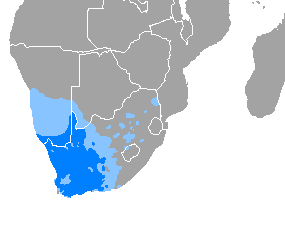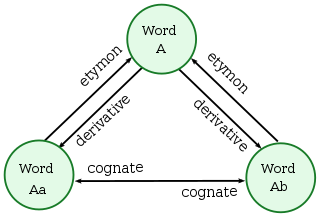Related Research Articles

Afrikaans is a West Germanic language that evolved in the Dutch Cape Colony from the Dutch vernacular of Holland proper used by Dutch, French, and German settlers and people enslaved by them. Afrikaans gradually began to develop distinguishing characteristics during the course of the 18th century. Now spoken in South Africa, Namibia and Botswana, Zambia, and Zimbabwe, estimates c. 2010 of the total number of Afrikaans speakers range between 15 and 23 million. Most linguists consider Afrikaans to be a partly creole language.

In historical linguistics, cognates or lexical cognates are sets of words in different languages that have been inherited in direct descent from an etymological ancestor in a common parent language. Because language change can have radical effects on both the sound and the meaning of a word, cognates may not be obvious, and often it takes rigorous study of historical sources and the application of the comparative method to establish whether lexemes are cognate. Cognates are distinguished from loanwords, where a word has been borrowed from another language.

The English language descends from Old English, the West Germanic language of the Anglo-Saxons. Most of its grammar, its core vocabulary and the most common words are Germanic. As a statistical rule, around 70 percent of words in any text are Old English.
This is a list of etymological lists.
Although English is a Germanic language, it has Latin influences. Its grammar and core vocabulary are inherited from Proto-Germanic, but a significant portion of the English vocabulary comes from Romance and Latinate sources. A portion of these borrowings come directly from Latin, or through one of the Romance languages, particularly Anglo-Norman and French, but some also from Italian, Portuguese, and Spanish; or from other languages into Latin and then into English. The influence of Latin in English, therefore, is primarily lexical in nature, being confined mainly to words derived from Latin and Greek roots.
In etymology, two or more words in the same language are called doublets or etymological twins or twinlings when they have different phonological forms but the same etymological root. Often, but not always, the words entered the language through different routes. Given that the kinship between words that have the same root and the same meaning is fairly obvious, the term is mostly used to characterize pairs of words that have diverged at least somewhat in meaning. For example, English pyre and fire are doublets with merely associated meanings despite both descending ultimately from the same Proto-Indo-European (PIE) word *péh₂ur.

Spanish is a Romance language which developed from Vulgar Latin in central areas of the Iberian peninsula and has absorbed many loanwords from other Romance languages like French, Occitan, Catalan, Portuguese, and Italian. Spanish also has lexical influences from Arabic and from Paleohispanic languages such as Iberian, Celtiberian and Basque.

Because of Germany's long history before 1871 as a non-united region of distinct tribes and states, there are many widely varying names of Germany in different languages, more so than for any other European nation. For example, in the German language, the country is known as Deutschland from the Old High German diutisc, in Persian as ‘’Alman’’ (آلمان), in Arabic as Almania (ألمانيا), in Spanish as Alemania and in French as Allemagne from the name of the Alamanni tribe, in Italian as Germania from the Latin Germania, in Polish as Niemcy from the Proto-Slavic nemets, and in Finnish and Estonian as Saksa and Saksamaa respectively from the name of the Saxon tribe.
C, or c, is the third letter in the Latin alphabet, used in the modern English alphabet, the alphabets of other western European languages and others worldwide. Its name in English is cee, plural cees.
Many words that existed in Old English did not survive into Modern English. There are also many words in Modern English that bear little or no resemblance in meaning to their Old English etymons. Some linguists estimate that as much as 80 percent of the lexicon of Old English was lost by the end of the Middle English period, including many compound words, e.g. bōchūs, yet the components 'book' and 'house' were kept. Certain categories of words seem to have been more susceptible. Nearly all words relating to sexual intercourse and sexual organs as well as "impolite" words for bodily functions were ignored in favor of words borrowed from Latin or Ancient Greek. The Old English synonyms are now mostly either extinct or considered crude or vulgar, such as arse/ass.
Arabic has had a great influence on other languages, especially in vocabulary. The influence of Arabic has been most profound in those countries visited by Islam or Islamic power.